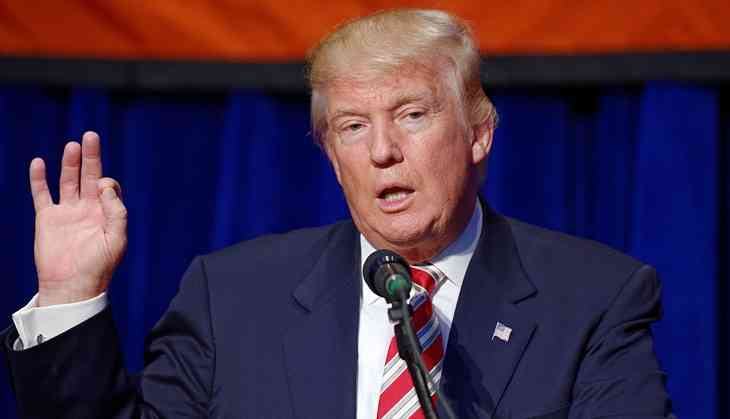Can Donald Trump be realistic with Iran?

In his apocalyptic speech, last Tuesday, at the United Nations General Assembly, addressing the Islamic Republic of Iran and North Korea, Donald Trump declared the Iran nuclear deal an "embarrassment" to the United States. Trump urged the international community not to let what he called the “murderous” Iranian regime to continue destabilising activities as it builds “dangerous missiles.” He also added that the US “cannot abide by an agreement if it provides cover for the eventual construction of a nuclear program”.
Not surprisingly, Donald Trump’s sulphuric talk about Iran has had the opposite effect in the international community and global public opinion. Only few world leaders, including the Israeli Prime Minister, Benjamin Netanyahu, applauded the boldness of the American President. Others termed it as his ignorance of international relations. In an interview, Iran's foreign minister, Mohammad Javad Zarif, said that President Trump's criticism of the nuclear deal was "absurd”. Moreover, he added that Iran would talk about changing the accord only if every concession it made – including retaking possession of the stockpile of nuclear fuel it shipped to Russia when the accord took effect – were reconsidered.
As for the Iranian President, in his speech to the UN General Assembly on September 20, he criticised the US president, accusing him of having “ignorant, absurd and hateful rhetoric filled with ridiculously baseless allegations, that was not only unfit to be heard at the United Nations – which was established to promote peace and respect between nations – but indeed contradicted the demands of our nations from this world body to bring governments together to combat war and terror”.
Rouhani’s moderate and reassuring tone was strengthened by an outline on Iran’s potential opportunities in the domains of trade and investment. “We are eager”, added Rouhani “to expand international transit corridors through joint ventures in sea, rail and road infrastructure projects. Our achievements in enhancing economic infrastructures in the fields of a nation-wide gas pipeline, national electricity grid, and rail and road transport have made it possible for various industries to produce at lower cost, with easy access to national and regional markets.
With the current conducive legal environment, many delegations of foreign investors have come to Iran, leading to an ever-increasing number of investments, joint ventures and financing agreements in various fields.” He stressed on the idea of Iranian hospitality and asserted that the Iranian government welcomed “the participation and cooperation of all investors, intellectuals and innovators from across the globe”.
“From this global podium and as the representative of the people of Iran – who are world-famous for their hospitality – I invite all those who seek peace, security and progress through partnership and cooperation among nations to visit Iran and join us in building this future of hope,” he said.
President Rouhani missed to be clear enough on Iran’s human rights issues and on the role played by the Iranian Revolutionary Guards in Syria. “The crises in Syria, Yemen and Bahrain do not have military solutions and can only be resolved through the cessation of hostilities, and the acceptance of the will and wishes of the populaces.”
However, despite President Rouhani’s contradictory statements and his lack of clarity about the Joint Comprehensive Plan of Action (JCPOA), it seems that the nuclear deal continues to be supported by the other members of the 5+1 group. During a meeting of the foreign ministers of Iran and the six signatories to the nuclear deal, hosted by the European Union’s foreign-policy chief, Federica Mogherini, the tone was clearly and bluntly against the Trump administration and in favour of the continuation of the agreement with Iran. “The nuclear agreement is working. It’s delivering. It’s functioning,” Mogherini told the journalists at the United Nations. Referring immediately to the North Korean crisis, she added: “In this moment, having a nuclear-non-proliferation agreement that is delivering, is quite a strategic instrument in the hands of the international community. It's not an irrelevant part of global security. We already have one potential nuclear crisis. We definitely do not need to go into a second one. This is an agreement that prevented a nuclear program and potentially prevented a military intervention. Let's not forget that.”
The conclusion is simple: despite President Trump’s hateful language against the Islamic Republic of Iran, the European signatories of the nuclear deal with Iran as well as Russia and China, which both have strategic and commercial alliances with Tehran, appear willing to break from Washington’s position that is getting closer everyday to Netanyahu’s anti-Iran mindset. So the least one can say is that President Trump’s approach towards Iran has been un-diplomatic and counterproductive, beginning with his frequent hints that Iran has not abided by the terms of the Joint Comprehensive Plan of Action (JCPOA).
Last, but not least, the recent Ballistic Missile tests by Iran is a clear response to Trump’s speech to the UN General Assembly and a way for the Iranian leadership to underline the fact that Tehran prioritise the survival of the Islamic regime over any other ideological goals, such as liberating Palestine and Jerusalem. This is a challenge that will continue to mount as long as Donald Trump and his administration do not understand that they have to put diplomatic talks with Iran ahead of some vague and unattainable military option against the Islamic regime.

